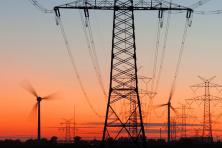We’re officially halfway through the 2023 legislative session here in Oregon, and there is A LOT to report about where we’re at on climate action.
The short version: Our top climate priorities for 2023 are still actively moving through the process and gaining momentum! Some other important legislative efforts have stalled and had some disappointing setbacks. Nothing is across the finish line yet, and the legislature is currently making hard choices due to a tight state budget, so we can’t stop pressing forward to ensure our elected leaders actually deliver on climate progress this year.
This year, Climate Solutions and many of our partner organizations have had a laser focus on ensuring the state legislature does two big things:
- Passes the “Building Resilience” policy package that sets a framework for reining in the state’s second most significant source of climate pollution, our homes and buildings, while increasing climate resilience and energy affordability for Oregonians; and
- Leverages the once-in-a-generation federal funding currently available for Oregon from last year’s Inflation Reduction Act (IRA) and Infrastructure Investment and Jobs Act (IIJA) to accelerate our state’s clean energy transition and make the climate solutions we need more affordable and accessible than ever before!
We are now past the first major legislative deadline of this year’s long session when policy bills were required to pass out of their first committee to still be considered “live” and move through the rest of the legislative process this session.
Building Resilience Policy Package
Great news so far on our top climate priority this session! I am happy to report that all Oregonians are closer to having access to safe and affordable homes and buildings that run on clean energy. The Senate Energy and Environment Committee voted to advance the Resilient, Efficient Buildings package of bills. It’s the first step to these bills becoming laws this year. These bills would supercharge the state’s efforts to ensure households and businesses can afford to upgrade to an electric heat pump. In addition, these bills help Oregonians weatherize and retrofit their home or business to make it more energy efficient and resilient. These policies are designed to leverage the massive amount of federal dollars available to Oregon to do this work now.
Together we have built incredible momentum, but we can’t stop now until the bills are through the legislative process and are signed into law. The next stop for the Building Resilience bills on their way through the process is the legislative budget committee (called the Joint Ways and Means Committee).
. Read our Resilient Building Coalition factsheet!
- Healthy Heating and Cooling for All: (SB 868)
- Leverage new federal incentives and existing state programs to accelerate heat pump adoption and increase weatherization and retrofits;
- Set a state goal to get 500,000 new heat pumps installed by 2030, with a priority for low-income and environmental justice communities; and
- Align Oregon’s energy efficiency programs with state climate goals.
- Pass a “Building Performance Standard” (SB 870)
- Reduce climate pollution and improve the energy efficiency of existing large commercial buildings over time. This policy represents a huge climate bang-for-its-buck while saving energy and improving indoor air quality.
- Build Smart from the Start (new construction): (SB 869)
- Strengthen building codes to increase energy efficiency and resilience; and
- Encourage low-carbon building materials.
- Smart State Buildings: (SB 871)
- Ensure public buildings walk the talk on Oregon’s efficiency and climate goals.
Climate Budget to Leverage One-Time Federal Funding
Congress recently passed historic legislation that will send billions of dollars into climate resilience, clean energy, and infrastructure to the states. Oregon is eligible for hundreds of millions of federal dollars for electrification, energy efficiency, and grid resilience but has received just a small amount so far. Fully leveraging federal funds requires us to expend a modest amount of state funds now. By doing so, we could see an exponential return on that investment, bringing benefits like more clean energy and resilient communities, grid and transmission improvements, zero-emission transportation, and job-creating clean energy projects. The Legislature needs to act in 2023 to position Oregon to maximize this once-in-a-generation funding infusion's economic and climate potential.
Unfortunately this year, the multi-million dollar question is whether the Legislature will actually fund the climate progress we desperately need at all. With the Governor and Joint Ways & Means co-chairs proposing across-the-board budget cuts, there’s a risk of slowing implementation of cornerstone climate programs, preventing new climate protections from being adopted, and hurting the State’s ability to leverage unprecedented federal investments in climate and communities. Legislators are currently deciding whether to invest in climate and communities or pour even more revenue into our already strong and healthy rainy day fund. We know that a modest investment today will help families have safer and cleaner homes, help communities reduce climate pollution, and create local clean energy jobs that can't be exported and will help our state weather any coming recession. Please see information below about how to urge the Ways & Means leadership to prioritize a strategic climate budget!
Key Bills to Accelerate Oregon’s 100% Clean Energy Transition
As Oregon accelerates the transition to a carbon-free grid, we need to make sure the state’s clean energy policy is consistent and inclusive of some of the state’s largest energy users. We also want to ensure how we transition to 100% clean energy results in economic benefits for communities across Oregon and increases resilience in the face of growing climate impacts. As the state transitions toward a cleaner and more equitable transportation system, leveraging federal funding to reduce the upfront cost of replacing diesel trucks, delivery vans, and buses with zero-emission vehicles is critical. These goals are reflected in the following bills:
- Electric Truck Rebates (HB 2714): Creates a Medium- Heavy-Duty Zero-Emission Vehicle Program that provides rebates for zero-emission vehicles like delivery trucks and buses and can attract and distribute anticipated federal funding.
- Status: Had public hearing; passed House Committee on Climate, Energy and Environment; currently in Joint Ways & Means Committee
- Renewable Hydrogen (HB 2530): Defines green electrolytic hydrogen. Directs Oregon Department of Energy to help draw down federal funding and accelerate renewable hydrogen in a regionally-aligned, climate-smart way.
- Status: Had public hearing; passed House Committee on Climate, Energy and Environment; currently in Joint Ways & Means Committee
- Microgrids and Rural Resilience (HB 3378): Supports counties’ development of energy resilience planning and integration into wildfire mitigation plans, which can also encourage microgrid systems to increase electric grid and energy resilience.
- Status: Had public hearing; passed House Committee on Climate, Energy and Environment; currently in Joint Ways & Means Committee
- 100% Clean Electricity for Big Tech (HB 2816): Applies the state’s 100% clean energy targets for data centers and cryptocurrency mining operations whose power is not currently regulated by HB 2021 to ensure the state’s major energy users are transitioning from coal and gas to carbon-free power by 2040.
- Status: Had public hearing; stalled out in House Committee on Climate, Energy and Environment
- Utility Customer Protection (HB 3152): Directs the Oregon Public Utility Commission to consider the climate in its decision-making. The bill also shifts the financial risk of expanding the fossil fuel system from residential utility customers to gas companies and their investors by ending the practice of using residential ratepayer funding to subsidize or incentivize new gas line extensions and new gas appliances after 2026.
- Status: Had public hearing; stalled out in House Committee on Climate, Energy and Environment
There are other promising opportunities for climate progress moving forward this session as well. Those bills include SB 522 to finally update our outdated state greenhouse gas targets, SB 530 to maximize carbon sequestration and climate resiliency on our forests, agricultural lands, and wetlands, HB 2990 to fund community resilience hubs across the state, and HB 2613 to restore funding for the state’s popular EV rebate program. (This is not an exhaustive list!)
Last updated 4/25/2023





